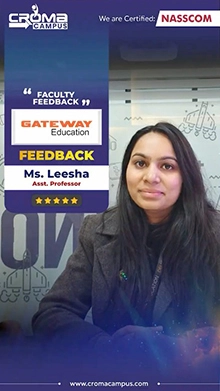Course Design By
Nasscom & Wipro
Master the Turkish language. Enroll today to become proficient in the Turkish language.
In collaboration with

400+
Corp. Tie-Ups
Online/Offline
Format
LMS
Life Time Access
we train you to get hired.

Course Design By
Nasscom & Wipro
Course Offered By
Croma Campus
Stories
success
inspiration
career upgrade
career upgrade
career upgrade
career upgrade
07-Mar-2026*
02-Mar-2026*
04-Mar-2026*
07-Mar-2026*
02-Mar-2026*
04-Mar-2026*
You will get certificate after
completion of program
You will get certificate after
completion of program
You will get certificate after
completion of program
in Collaboration with

Empowering Learning Through Real Experiences and Innovation
we train you to get hired.
Phone (For Voice Call):
+91-971 152 6942WhatsApp (For Call & Chat):
+91-971 152 6942Get a peek through the entire curriculum designed that ensures Placement Guidance
Course Design By
Course Offered By
Ready to streamline Your Process? Submit Your batch request today!
Highest Salary Offered
Average Salary Hike
Placed in MNC’s
Year’s in Training

fast-tracked into managerial careers.
Get inspired by their progress in the
Career Growth Report.
FOR QUERIES, FEEDBACK OR ASSISTANCE
Best of support with us





An OTP on your submit Mobile No has been shared.please check and submit OTP

We’re the best training provider with rigorous industry-relevant programs designed and delivered in collaboration with world-class faculty, industry & Infrastructure.
Share some of your details and we will be in touch with you for demo details, and know about Batches Available with us!
By registering here, I agree to Croma Campus Terms & Conditions and Privacy Policy



Enter your email and phone number
For Voice Call
+91-971 152 6942For Whatsapp Call & Chat
+91-9711526942Talk to Career Counsellor

Stay ahead in your career with real-time salary updates.
By registering here, I agree to Croma Campus Terms & Conditions and Privacy Policy

We’re the experts in web design and development for the start up next door and the fortune 500.

What Benefit You will get from this Program
By registering here, I agree to Croma Campus1 Terms & Conditions and Privacy Policy
Share some of your details and we will be in touch with you for demo details, and know about Batches Available with us!























 Career Transition
Career Transition Career Gap
Career Gap Placement Activities
Placement Activities Placement Drives
Placement Drives Latest Hiring
Latest Hiring













